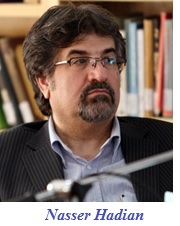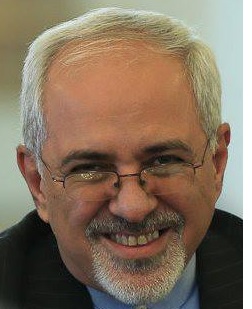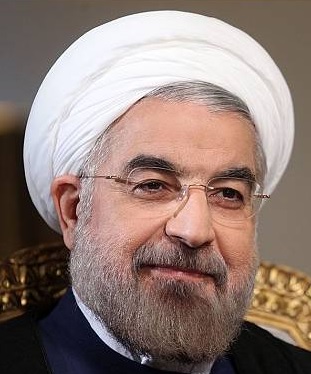Nasser Hadian
 Iran’s entire socio-political landscape has changed since President Hassan Rouhani’s June election. There are a lot of hopes that things are going to get better, especially given what happened under the previous government. But this is a cautious hope or optimism, not the wild-eyed optimism of former President Mohammad Khatami’s era. Everything seemed possible in the late 1990s. Now hope is more balanced and realistic.
Iran’s entire socio-political landscape has changed since President Hassan Rouhani’s June election. There are a lot of hopes that things are going to get better, especially given what happened under the previous government. But this is a cautious hope or optimism, not the wild-eyed optimism of former President Mohammad Khatami’s era. Everything seemed possible in the late 1990s. Now hope is more balanced and realistic.
Rouhani is a more pragmatic politician than Khatami, who was more of an intellectual and moral individual. Rouhani is more like former President Bill Clinton, someone who can deliver.
Iran's new president is also an insider. Rouhani knows how to navigate the corridors of power in Iran. He has known the supreme leader for some 40 years. And Rouhani has been his representative for 25 years on the Supreme National Security Council. So Rouhani also knows other power centers and how to maneuver them, which Khatami was reluctant to do. No one can question Rouhani’s professionalism, credibility or national security credentials.
Rouhani can formulate a strategy. The Scotland-educated cleric is a sophisticated politician who has the patience and knowledge required to achieve his objectives. Even conservatives, radicals and principlists cannot question his qualifications. His insider status is an asset rather than a liability.
Foreign Policy
 On foreign policy, Rouhani’s appointment of Mohammad Javad Zarif (left) was an important signal to the world. There were a number of alternatives. So Zarif’s appointment signaled that Rouhani cares about international affairs, wants to improve Iran’s image, and resolve the nuclear dispute. As ambassador to the United Nations from 2002 to 2007, Zarif was a key figure in diplomacy and the nuclear issue. He was also important in terms of Iran’s image abroad, particularly in the West. Zarif speaks English fluently after receiving two degrees from San Francisco State University and a doctorate in international relations from the University of Denver. He has been Iran’s best diplomat since the revolution and virtually everyone acknowledges his credentials.
On foreign policy, Rouhani’s appointment of Mohammad Javad Zarif (left) was an important signal to the world. There were a number of alternatives. So Zarif’s appointment signaled that Rouhani cares about international affairs, wants to improve Iran’s image, and resolve the nuclear dispute. As ambassador to the United Nations from 2002 to 2007, Zarif was a key figure in diplomacy and the nuclear issue. He was also important in terms of Iran’s image abroad, particularly in the West. Zarif speaks English fluently after receiving two degrees from San Francisco State University and a doctorate in international relations from the University of Denver. He has been Iran’s best diplomat since the revolution and virtually everyone acknowledges his credentials. I’m optimistic that Iran can solve the dispute over its nuclear energy program. If an agreement is not reached, then the United States is probably creating barriers.
But on improving Iran-U.S. relations, I’m not very optimistic. Relations might improve but not to a great extent. In both Tehran and Washington, criticism of the other country is rewarded. A member of Iran’s parliament would pay a price for calling for better relations with the United States. And the same is true for a member of Congress. Look at previous resolutions from the House of Representatives. A total of 130 members said they wanted to give diplomacy with Iran a chance in a July 2013 letter to President Barack Obama. But once a new sanctions bill was put on the table, over 400 representatives voted for it — including more than 100 of those who signed the letter.
Lawmakers on both sides are afraid because it’s popular and easier to criticize the other country. So this structure should be changed. But how? It’s not an easy thing to do in either capital.
Nuclear Program
On the nuclear dispute, Iran and the United States want to get similar things out of a deal. Washington doesn’t want Tehran to have a bomb. And Tehran doesn’t want one either. But Iran has to give guarantees to the West that it doesn’t want a bomb. Verification systems will be a particularly important part of an agreement. An additional protocol should take care of this issue, and Iran would likely ratify that part of a deal. Tehran would also likely agree – in the end – to limit its uranium enrichment program and the size of its enriched uranium stockpile. Iran could also limit the number of centrifuges. But there are minimum requirements for Iran – such as retaining the right to enrichment and having centrifuges.
In return, Iran wants the removal of all sanctions imposed since 2008– unilateral and multilateral. Tehran also wants the E.U. incentive proposals to be put back on the table. They included investment in the oil industry, technology transfers, airplane parts and many other things. But that would most likely be part of the end game. An agreement could be implemented stage by stage, with the whole package initially agreed upon.
But Iranians are very suspicious of the end game. If they come to the negotiating table, agree and implement the first and second steps of a settlement, then the United States may tell Iran that it cannot enrich uranium.
Closing down the Fordo nuclear facility would not be an option for Iran. The government wants to retain the ability to enrich uranium. And Fordo is the one safe place for enrichment. Israel, Saudi Arabia, Pakistan and other nations cannot attack and destroy it. Only U.S. bunker-buster bombs could destroy the facility, which is built into the mountains.
The Supreme Leader
 Iran has achieved what it wanted – mastering the knowledge and technology of enrichment. Ideally, Tehran would like to have hundreds of thousands of centrifuges. But Iran achieved its minimum goals, so it is ready to make a deal. And Rouhani is fully empowered to cut one.
Iran has achieved what it wanted – mastering the knowledge and technology of enrichment. Ideally, Tehran would like to have hundreds of thousands of centrifuges. But Iran achieved its minimum goals, so it is ready to make a deal. And Rouhani is fully empowered to cut one. The supreme leader (left), however, is not interested in restoring full diplomatic relations with the United States. He probably would not object to better relations and allowing exchanges. But Ayatollah Khamenei would not, for example, approve the opening of a new U.S. embassy.
An agreement on the nuclear issue, however, could create momentum that would have a trickle-down effect on U.S.-Iran relations. Such momentum would have its own dynamism. But for now, the default position is hostile to full diplomatic relations with the United States. Journalists, athletes, museum directors and academics may have an easier time going to and from Iran. Exchanges, however, would not likely lead to an economic or diplomatic relationship —at least anytime soon.
Obstacles to Outreach
 Some factions in Iran will almost certainly push back and make it more difficult for Rouhani (left) to improve relations with the outside world. Not many people will oppose better relations with Iran’s neighbors. But there may be some disputes about prioritizing relations with other regional powers. For example, should Iran devote more resources to strengthening ties with Turkey, Saudi Arabia or Pakistan? Some will call for looking east rather than west.
Some factions in Iran will almost certainly push back and make it more difficult for Rouhani (left) to improve relations with the outside world. Not many people will oppose better relations with Iran’s neighbors. But there may be some disputes about prioritizing relations with other regional powers. For example, should Iran devote more resources to strengthening ties with Turkey, Saudi Arabia or Pakistan? Some will call for looking east rather than west. Saudi Arabia is becoming a more pressing issue in Iran. The monarchy seems to be waging war against Tehran almost everywhere. Iranian relations with Syria, Lebanon, Hezbollah, and Iraq are basically oriented toward deterrence, defense and retaliation in case of attack. Tehran’s goal is not to project power. But Saudi Arabia is projecting power in Syria, Egypt, Yemen, Libya, Tunisia, Iraq, Afghanistan, Pakistan, Jordan, and Bahrain. The Saudi government is waging war on oil prices too by boosting production. And Saudi Arabia is even building infrastructure in Iran’s Baluchistan, Kurdistan, and Khuzestan provinces. Tehran’s policy, so far, has been a policy of appeasement but that is beginning to change. The 2011 Saudi attack on Bahraini protestors was insulting to Iran, as was the hanging of some Iranian citizens in Saudi Arabia.
Improving relations with the West, especially the United States, will be more controversial. Some will do their utmost to prevent it. Rouhani has a chance to improve relations with Britain, but he may encounter pushback from hardliners. So Rouhani’s government will likely take gradual steps to ease tensions.
Engaging other European countries will not be as sensitive of an issue. I’m hopeful that Iran’s image and relationship with European countries will improve within coming months, especially if steps are taken towards resolving the nuclear dispute.
Rouhani is likely to encounter stiff opposition to improved relations with the United States. Some bazaaris have vested interests in China. Basijis, voluntary militiamen, have built their credentials on being anti-American. Some members of parliament have done the same. Some socially conservative forces fear that reestablishing relations with the United States would lead to decay of traditional values. Some radicals and principlists are opposed to rapprochement on either political grounds or social reasons.
The Revolutionary Guards Corps, Iran’s most powerful military organization, may not support better relations with the United States. But some commanders or factions may not oppose moves in that direction either. After the supreme leader’s recent speech, the Guards will probably go back to their barracks to build themselves up as a military force, rather than a political force. Khamenei said they need to understand politics, but warned them to not get involved in politics.
Nasser Hadian is a professor of political science at the University of Tehran.
